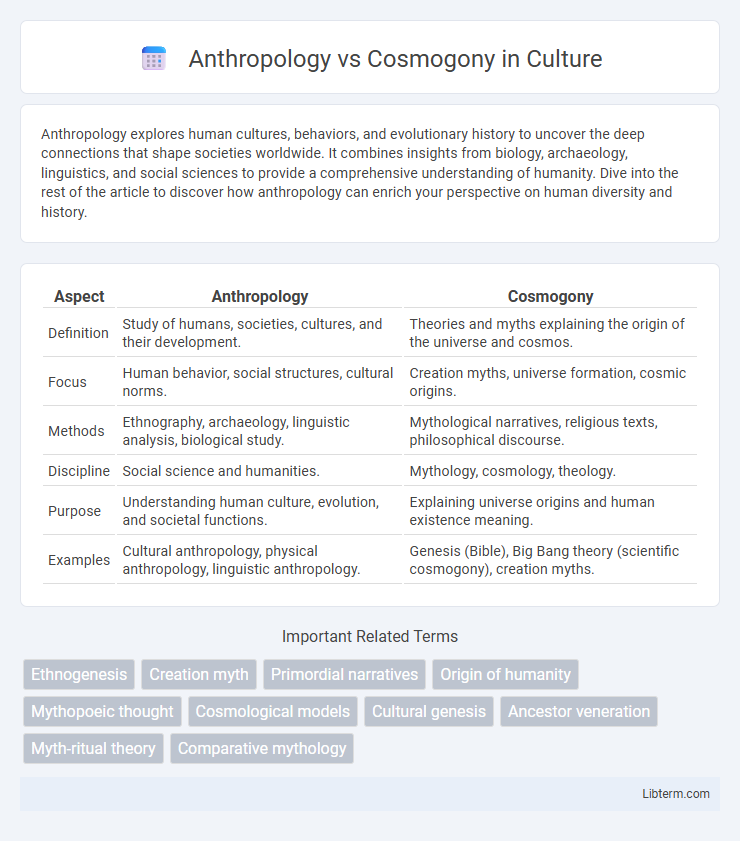Anthropology explores human cultures, behaviors, and evolutionary history to uncover the deep connections that shape societies worldwide. It combines insights from biology, archaeology, linguistics, and social sciences to provide a comprehensive understanding of humanity. Dive into the rest of the article to discover how anthropology can enrich your perspective on human diversity and history.
Table of Comparison
| Aspect | Anthropology | Cosmogony |
|---|---|---|
| Definition | Study of humans, societies, cultures, and their development. | Theories and myths explaining the origin of the universe and cosmos. |
| Focus | Human behavior, social structures, cultural norms. | Creation myths, universe formation, cosmic origins. |
| Methods | Ethnography, archaeology, linguistic analysis, biological study. | Mythological narratives, religious texts, philosophical discourse. |
| Discipline | Social science and humanities. | Mythology, cosmology, theology. |
| Purpose | Understanding human culture, evolution, and societal functions. | Explaining universe origins and human existence meaning. |
| Examples | Cultural anthropology, physical anthropology, linguistic anthropology. | Genesis (Bible), Big Bang theory (scientific cosmogony), creation myths. |
Defining Anthropology and Cosmogony
Anthropology studies human beings' origins, behavior, culture, and social structures through disciplines such as cultural, physical, and archaeological anthropology. Cosmogony specifically explores the origins and development of the universe, addressing creation myths, cosmological theories, and the nature of existence. While anthropology centers on human life and societies, cosmogony delves into the broader questions of how the cosmos and its elements came into being.
Historical Origins of Anthropology and Cosmogony
Anthropology originated as a scientific discipline in the 19th century, emphasizing the study of human cultures, societies, and biological evolution through empirical observation and comparative analysis. Cosmogony, rooted in ancient mythologies and religious traditions, addresses the creation and origin of the universe, often conveyed through symbolic narratives predating formal scientific inquiry. The historical divergence highlights anthropology's development from Enlightenment rationalism, contrasting with cosmogony's foundation in mythic frameworks and cosmological explanations across diverse civilizations.
Core Concepts in Anthropology
Anthropology studies human societies, cultures, and their development focusing on core concepts such as cultural relativism, ethnography, and social structures. It analyzes human behavior, language, and evolution to understand societal norms and relationships. Cosmogony, in contrast, explores the origins of the universe, emphasizing mythological and scientific explanations distinct from anthropology's human-centered approach.
Fundamental Themes in Cosmogony
Cosmogony explores fundamental themes such as the origin of the universe, the creation of celestial bodies, and the emergence of life, emphasizing mythological and cosmological narratives that explain existence. Anthropology examines human cultures and societies, often studying cosmogonic myths to understand how different cultures interpret creation and their place in the cosmos. The comparative analysis of cosmogony provides insight into universal patterns of belief, symbolic meaning, and the intersection between science and spirituality in human thought.
Methodological Differences
Anthropology employs ethnographic fieldwork, participant observation, and cultural analysis to study human societies, behaviors, and cultural meanings. Cosmogony relies on mythological narratives, religious texts, and cosmological models to explore the origins of the universe and life. These methodological differences highlight anthropology's empirical and qualitative approach versus cosmogony's interpretive and often symbolic framework.
Key Questions Addressed by Each Field
Anthropology explores questions related to human behavior, culture, social structures, and evolution, seeking to understand how humans interact with their environments and each other. Cosmogony addresses the origins of the universe, existence, and the forces that shaped the cosmos, focusing on myths, scientific theories, and cosmological explanations. Both fields investigate origins but differ in scope: anthropology centers on human origins and societal development, while cosmogony examines universal creation and the nature of existence.
Intersections Between Anthropology and Cosmogony
Anthropology and cosmogony intersect in their exploration of human origins and cultural narratives surrounding creation. Anthropological studies analyze myths, rituals, and belief systems that cosmogonic stories embody, revealing how societies construct meaning about the universe and humanity's place within it. This interdisciplinary approach enhances understanding of both the symbolic significance and social functions of creation myths across diverse cultures.
Influential Theories and Thinkers
Anthropology examines human societies and cultures through influential theories like structuralism by Claude Levi-Strauss and cultural materialism by Marvin Harris, while cosmogony explores the origins of the universe with ancient mythologies and modern scientific models like the Big Bang theory proposed by Georges Lemaitre. Key thinkers in anthropology include Bronislaw Malinowski, known for functionalism, contrasting with cosmogony's reliance on figures such as Hesiod, who narrated Greek creation myths, and contemporary astrophysicists like Stephen Hawking who advanced cosmological understanding. These disciplines employ distinct epistemologies; anthropology uses ethnographic methods, whereas cosmogony integrates astronomy, physics, and mythology to address existential questions.
Cultural and Scientific Impacts
Anthropology explores human cultures, behaviors, and social structures, providing scientific insights into human diversity and evolution through empirical research. Cosmogony studies the origin of the universe, influencing cultural worldviews and religious beliefs that shape societies' understanding of existence. Both fields impact cultural identity and scientific knowledge, with anthropology contributing empirical methods and cosmogony offering foundational cosmological narratives.
Future Directions in Anthropology and Cosmogony
Future directions in anthropology emphasize integrating digital technologies and interdisciplinary methods to better understand human cultural evolution and social dynamics. Cosmogony research increasingly incorporates astrophysical data and cosmological simulations to refine models of universe origins and development. Innovations in both fields highlight the convergence of empirical evidence and theoretical frameworks to explore existential questions about humanity and the cosmos.
Anthropology Infographic

 libterm.com
libterm.com